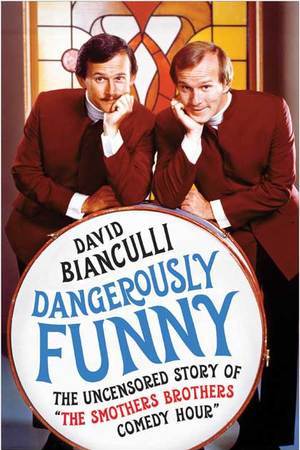David Bianculli: Dangerously Funny: The Uncensored Story of “The Smothers Brothers Comedy Hour”
Books Reviews David Bianculli
TV critic fills in details of historic primetime battle
The Smothers Brothers occupy a strange space in the history of pop culture. Battles with network censors over their groundbreaking variety series, The Smothers Brothers Comedy Hour, are the stuff of legend. By the time the Smothers got fired in 1969 (they bristle at the notion that the show was cancelled), Comedy Hour had become a benchmark for political expression and satire in prime time.
Retelling the story often over-simplifies it—Tom and Dick Smothers spoke out on the air against the Vietnam War and poked fun at politicians, then they were silenced by the big corporate powers. But NPR television critic David Bianculli’s new history gives a full account with 360 pages of devilish details.
Bianculli devotes the bulk of his work to the period when Comedy Hour was conceived, produced and ultimately removed from its Sunday-night slot, leaving only a few chapters on Tom and Dick Smothers’ career before and after the show. This feels right—the best stories are the increasingly dramatic week-to-week battles between the idealistic, strong-willed Tom Smothers and CBS censors and brass.
At the outset, CBS thought they had a couple of clean-cut kids who would book older acts like Kate Smith and Jack Benny, yet still appeal to a younger crowd. Tom wanted the show to be more socially conscious, but misunderstood the amount of creative control he and Dick were given in their agreement with the network. Without clear terms for what was acceptable, every network-deleted scene became increasingly frustrating to Tom Smothers, who began to wage a war of his own against the network.
Some battles were small, even playful. Tom and the writers would often slip the nonsense phrase “rowing to Galveston” into a script and instruct the cast and crew to laugh loudly. The censors always cut it, fearing some new offensive slang term.
Then battles grew bigger and more meaningful. The censors cut would-be offensive lines here and there, then whole sketches and songs. The network allowed the long-blacklisted Pete Seeger on the show, but cut his anti-war anthem, “Waist Deep in the Big Muddy.” Tom got that one back in, but had to fight again for Harry Belafonte’s performance of “Don’t Stop the Carnival,” featuring a backdrop of footage from the recent Democratic National Convention, complete with riot scenes.
CBS got letters from viewers complaining that the Brothers were un-American. President Lyndon Johnson requested, through a friend at the network, that the Smothers tread lightly. Ethel Kennedy took exception to a sketch that made light of husband Robert F. Kennedy’s indecision about running for president. The barbs at Richard Nixon were especially pointed—Tom Smothers swears that Nixon had a direct hand in the show’s demise, and while Bianculli admits he never found a “smoking gun” to prove it, he does offer some incriminating coincidences.
The book reaches a fever pitch with Bianculli’s fascinating blow-by-blow account of the final days of the Comedy Hour—the flurry of memos and gamesmanship that forced the Smothers off the air and threw them into a years-long career funk.
Bianculli, to his credit, doesn’t let the gripping censorship battle overshadow the fact that Comedy Hour was a fantastic and influential show. “It’s not that much of a stretch to imagine Tom Smothers, not Lorne Michaels of Saturday Night Live, as the tenured tastemaker, in both comedy and music, for a new generation of TV viewer,” he writes.
Bianculli draws a lineage from the Smothers’ faux presidential candidate Pat Paulsen up through Andy Kaufman, The Daily Show and Stephen Colbert. He illuminates the writer’s room, which included Rob Reiner, Steve Martin and “Gentle On My Mind” composer John Hartford. And he highlights Tom Smothers’ quest for new musical talent, his music scouts Mason Williams and Pat Paulson bringing Jefferson Airplane, The Who and The Doors to the show before most of America knew who they were.
In the book, Tom Smothers says that he and Dick would like to do one more TV show. The brothers went through couples counseling (literally), and they’ve had decades to hone their performance skills. The thought of this comedic team on the airwaves once again is a wistful way to end the story, a wonderful “what if.”